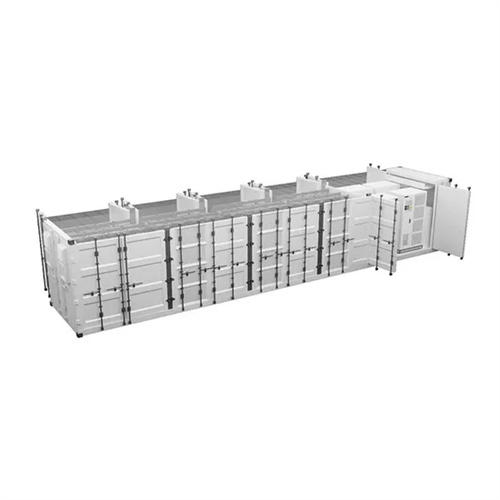Decentralised smart energy systems Cambodia

DENSYS – Erasmus Mundus Master Programme on Decentralised Smart Energy
Decentralised smart energy systems (e.g. isolated villages, small cities, urban districts, rural areas connected or not to the electric grid, etc.) play an increasing role in the perspective of a

Modeling techniques for decentralized energy systems applied in smart
After the Second World War, all advanced countries chose to develop a centralized electrical system to transport energy throughout the national territory and then distribute it to the various

Boosting Energy Resiliency with Decentralised Energy Solutions
Which is why decentralised energy systems are now moving into focus, offering bidirectional flows of electricity and greater control to optimise energy flow. Meanwhile, Cambodia has achieved remarkable success with off-grid energy infrastructure, increasing electricity access for over 2 million rural homes. Twenty years ago, only 16.6% of

Decentralised Control and Peer-To-Peer Cooperation in Smart Energy Systems
Indeed, in different niches decentralised approaches have been used successfully (decoupled microgrids, peer-to-peer networks, etc.). This chapter explores how decentralised approaches can fit the future energy system and how it can empower people for engaging in the energy transition. All of these evolutions push also the control in the

"Leave no one behind". A power-capabilities-energy justice
Han and Kimura (2019) describe two types of energy poverty in Cambodia: i) grid-connected citizens having access to modern energy technologies but are constrained in the consumption

Distributed energy systems: A review of classification,
They also discussed the energy prospects of both fossil fuels and renewable energy systems. They recommended that fossil fuel-based energy systems would not be a long-term solution to electrical power production in years to come. Singh and Sharma [11] presented the status of DES planning in a decentralized power system network. They also

From the Bottom Up: Designing a Decentralized Power System
AEG uses the resources we have (and a few on the way) to create the most resilient and economic grid possible. At the moment, AEG is a highly theoretical framework for our future energy systems to build from, with potential application 10 years out and only a few early adopters currently trialing the technology.

Decentralized Smart Energy Systems
Overview. Decentralized Smart Energy Systems from University of Lorraine aims to educate top skilled engineers with multiphysics approaches, who will be able to design, size, optimize and operate decentralised smart energy systems, with skills and expertise in the mechanical, aeronautical, chemical and electrical engineering disciplines and a sufficient level of systemic

What is ''local'' about Smart Local Energy Systems? Emerging
Given that these kinds of new decentralised energy systems will require more active engagement from the public, imaginaries such as prosumer [i.e. producer and consumer; [110]] and energy citizens [23] are arguably the more appropriate way to recognise the knowledge, capabilities and opportunities that could be afforded to individuals by

Can the UK ever achieve a fully decentralised energy system?
Fava predicts that smart energy systems could save UK energy customers £8bn per year, using existing technology to "dramatically reduce the amount of new infrastructure we need" through the digital management of supply and demand at local and national levels, creating "energy systems fit for the future".

A general form of smart contract for decentralized energy systems
An energy system can be described as a collection of distinct networks, sources, sinks, their corresponding responsible parties, and the associated physical and information

ACCELERATING SDG 7 ACHIEVEMENT ACTION BRIEF 5
The Ministerial Declaration of the 2018 High-Level Political Forum1 underlined the potential of decentralised renewable energy solutions for closing the energy access gap. As a result, a Global Action Plan for Decentralised Renewable Energy was established, which aims to catalyse the full potential of decentralised renewable energy

Strategies for smart integrated decentralised energy systems
The Dutch government aims to increase renewable power generation by 500% by 2030. This will require radical changes to how the country''s energy system works, and this report sought to find out what the potential is for Smart Integrated Decentralised Energy (SIDE) systems, a highly sustainable and resilient subset of microgrids, to contribute to the renewable energy transition.

Decentralized Renewable Energy Systems: A Status
These criteria facilitate the understanding of decentralized energy systems needed to spur their development and diffusion. The trend toward decentralized energy systems is likely to be enforced in the future due to

The path to a sustainable electricity system: decentralised control
Instead of a fragile and rigid system, it can become a flexible and responsive asset. The impact of reimagining the electricity system. This tectonic shift can also impact the

Decentralised Energy Systems: What is decentralised
Lucy Carpinelli, Solution Architect at Evergen explains the difference between a centralised and decentralised energy system, the role of renewable energy technologies, and smart grids. As a Solution Architect at

Related Contents
- Cambodia moser energy systems
- Bx energy systems Cambodia
- Smart energy systems san diego Saint Martin
- Mayotte smart energy systems
- Switzerland boost energy systems
- Bioferm energy systems Bermuda
- Guadeloupe regli energy systems ag
- Fortes energy systems Norway
- Battery costs for industrial and commercial energy storage systems
- Black box energy systems Uzbekistan
- Different types of energy storage systems Saint Barthélemy
- South Sudan energy efficient systems